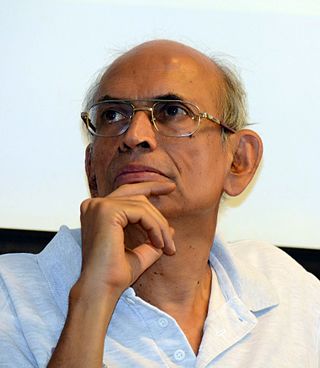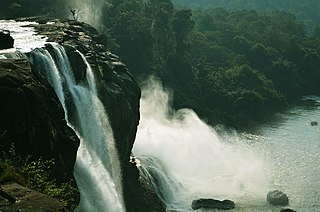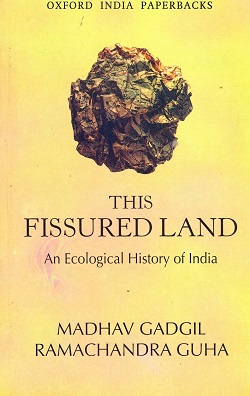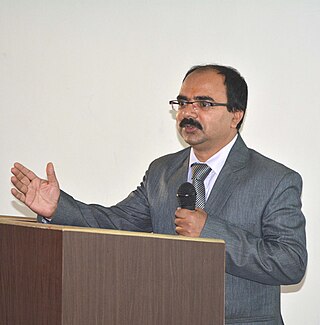
The Western Ghats, also known as the Sahyadri, is a mountain range that stretches 1,600 km (990 mi) along the western coast of the Indian peninsula. Covering an area of 160,000 km2 (62,000 sq mi), it traverses the states of Gujarat, Maharashtra, Goa, Karnataka, Kerala, and Tamil Nadu. The range forms an almost continuous chain of mountains along the western edge of the Deccan Plateau, from the Tapti River to Swamithoppe in Kanyakumari district at the southern tip of the Indian peninsula. The Western Ghats meet with the Eastern Ghats at Nilgiris before continuing south.

Krishnaswamy Kasturirangan is an Indian space scientist who headed the Indian Space Research Organisation (ISRO) from 1994 to 2003. He is presently Chancellor of Central University of Rajasthan and NIIT University. He is the former chancellor of Jawaharlal Nehru University and the chairman of Karnataka Knowledge Commission. He is a former member of the Rajya Sabha (2003–09) and a former member of the now defunct Planning Commission of India. He was also the director of the National Institute of Advanced Studies, Bangalore, from April 2004 to 2009. He is a recipient of the three major civilian awards from the Government of India: the Padma Shri, the Padma Bhushan and the Padma Vibhushan.

Madhav Dhananjaya Gadgil is an Indian ecologist, academic, writer, columnist and the founder of the Centre for Ecological Sciences, a research forum under the aegis of the Indian Institute of Science. He is a former member of the Scientific Advisory Council to the Prime Minister of India and the Head of the Western Ghats Ecology Expert Panel (WGEEP) of 2010, popularly known as the Gadgil Commission.

Athirappilly is a first grade Grama Panchayath with 489.00 km2 area in Chalakudy Taluk, Thrissur district in Kerala, India. It is located 60 km from Thrissur city, 70 km northeast of Kochi city, 55 km northeast of Cochin International Airport, and 30 km from Chalakudy town.

Athirapilly Falls is situated in Athirapilly Panchayat in Chalakudy Taluk of Thrissur District in Kerala, India on the Chalakudy River, which originates from the upper reaches of the Western Ghats at the entrance to the Sholayar ranges. It is the largest waterfall in Kerala, which stands tall at 81.5 feet. Just a short drive from Athirapilly is the Vazhachal Falls, which is close to dense green forests that are home to many endangered and endemic species of flora and fauna.

Sacred groves of India are forest fragments of varying sizes, which are communally protected, and which usually have a significant religious connotation for the protecting community. Hunting and logging are usually strictly prohibited within these patches. Other forms of forest usage like honey collection and deadwood collection are sometimes allowed on a sustainable basis. NGOs work with local villagers to protect such groves. Traditionally, and in some cases even today, members of the community take turns to protect the grove. The introduction of the protected area category community reserves under the Wild Life (Protection) Amendment Act, 2002 has introduced legislation for providing government protection to community held lands, which could include sacred groves.
The M. S. Swaminathan Research Foundation (MSSRF) is a nonprofit NGO trust based in Chennai, India. It develops and promotes strategies for economic growth that directly target increased employment of poor women in rural areas. Their methods maximize the use of science and technology for equitable and sustainable social development and environmental stability. The MSSRF logo signifies continuity and change, invoking the DNA model of open-ended, many-sided, and continuous evolution.

The Sálim Ali Centre for Ornithology and Natural History (SACON) is the South India centre of WII. It is a national centre for information, education and research in ornithology and natural history in India.

Dhananjay Ramchandra Gadgil, also known as D. R. Gadgil, was an Indian economist, institution builder and the vice-chairman of the Planning Commission of India. He was the founder Director of the Gokhale Institute of Politics and Economics, Pune and the author of the Gadgil formula, which served as the base for the allocation of central assistance to states during the Fourth and Fifth Five Year Plans of India. He is credited with contributions towards the development of Farmers' Cooperative movement in Maharashtra. The Government of India recognised his services by issuing a commemorative postage stamp in his honour in 2008.

Awaaz Foundation is a charitable trust and non-governmental organisation in Mumbai, India which builds awareness, carries out advocacy, and is involved in educational projects to protect the environment and prevent environmental pollution. It has impacted many important decisions by the government and influenced policy making in important environmental matters in India. The beneficiaries of the Foundation are the citizens of India at large.
Nirmal Ulhas Kulkarni is a herpetologist, field ecologist, conservationist, and wildlife photographer. Director (Ecology) of Wildernest Nature Resort, an eco-tel in the Chorla Ghats (Goa), Chairman of the Mhadei Research Centre, Team Lead of Hypnale Research Station and promoter of HERPACTIVE, a study initiative on Herpetofauna. As of December 2012, he lives in Goa.
Gundia River is a second order tributary of the Netravathi river in the state of Karnataka in southern India. A proposal by the Government of Karnataka to build a hydroelectric project across the river and its tributary streams has generated controversy and opposition from environmentalists.
Kerala Science Congress is an annual gathering of Kerala-based scientists and scholars organised by Kerala State Council for Science, Technology and Environment (KSCSTE) for revitalizing Research and Development activities in Kerala and to identify new talents in scientific research in Kerala. KSCSTE is an autonomous body constituted by the Government of Kerala. The gathering features talks by invited scientists, presentations of research papers and awards of various prizes.
Joice George is an Indian politician and a Member of Parliament of the 16th Lok Sabha of India.

This Fissured Land: An Ecological History of India is a book by Madhav Gadgil and Ramachandra Guha on the ecological history of India. It examines 'prudent' (sustainable) and 'profligate' (unsustainable) use of natural resources, and their effects. It describes the ecological history of India, from the first humans, through the ages of hunter-gatherers, farmers, empires and the British Raj.
Gadgil is a Chitpavan brahmin surname from Maharashtra, India.

Vadayil Sankaran Vijayan is an Indian environmentalist, wildlife biologist, ornithologist, an admirer of naturopathy and the founding Director of the Salim Ali Centre for Ornithology and Natural History. He is currently the chairman of the Salim Ali Foundation.
Eco-Sensitive Zones (ESZs) or Ecologically Fragile Areas (EFAs) are areas in India notified by the Ministry of Environment, Forests and Climate Change (MoEFCC), Government of India around Protected Areas, National Parks and Wildlife Sanctuaries. The purpose of declaring ESZs is to create some kind of "shock absorbers" to the protected areas by regulating and managing the activities around such areas. They also act as a transition zone from areas of high protection to areas involving lesser protection. As per the National Wildlife Action Plan (2002-2016), issued by the Union Ministry of Environment, Forest and Climate Change, land within 10 km of the boundaries of national parks and wildlife sanctuaries are to be notified as eco-fragile zones or Eco-sensitive Zones.

Sanjeeva Nayaka is an Indian lichenologist. He is a Chief Scientist at CSIR-National Botanical Research Institute (CSIR-NBRI), Lucknow. He is in charge of the lichenology laboratory. He serves as managing editor of the journal Cryptogam Biodiversity and Assessment, and editor of ILS eLetters, both published by the Indian Lichenological Society.

Karachepone N. Ninan is an ecological economist. Dr. Ninan was born in Nairobi, Kenya where he had his early school education. Thereafter he relocated to India where he continued his high school and college education.













